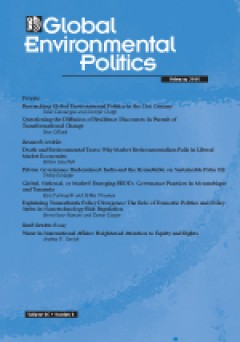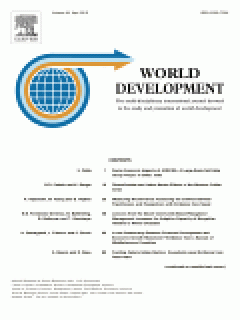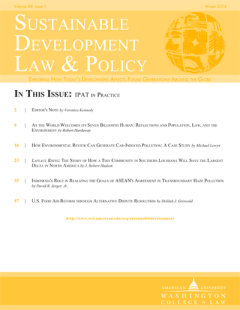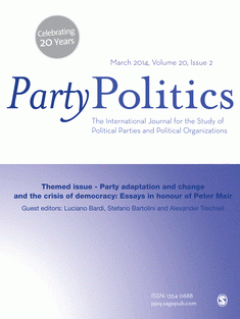Filter by

Global, National, or Market? Emerging REDD+ Governance Practices in Mozambiqu…
This article examines emerging governance practices in the REDD (Reducing Emissions from Deforestation and Forest Degradation) initiative. We examine three different general governance practices (neoliberal, post-national, and government-led practices) that have been applied in the interaction between international organizations and two REDD target countries: Mozambique and Tanzania. In these c…
- Edition
- Volume 16, Number 1, February 2016, p. 59–78.
- ISBN/ISSN
- 1526-3800
- Collation
- -
- Series Title
- Global Environmental Politics
- Call Number
- -

Private Governance Undermined: India and the Roundtable on Sustainable Palm Oil
Are emerging markets undermining private environmental governance? In the past, most trade in agricultural commodities occurred between developed and developing countries, but in recent years the volume of South-South trade has increased significantly. The booming demand from emerging markets for food, feed, and fiber is now a key driver behind agricultural expansion, causing large-scale defore…
- Edition
- Volume 16, Number 1, February 2016, p. 38–58.
- ISBN/ISSN
- 1526-3800
- Collation
- -
- Series Title
- Global Environmental Politics
- Call Number
- -

Questioning the Diffusion of Resilience Discourses in Pursuit of Transformati…
Desirable responses to global environmental challenges are increasingly being characterized as requiring transformational social change. Keeping pace with this growing imperative, discourses of resilience are shifting away from an emphasis on durability toward more progressive themes. After briefly revisiting the interdisciplinary origin of social-ecological resilience, some lingering concerns …
- Edition
- Volume 16, Number 1, February 2016, p. 13–20.
- ISBN/ISSN
- 1526-3800
- Collation
- -
- Series Title
- Global Environmental Politics
- Call Number
- -

Death and Environmental Taxes: Why Market Environmentalism Fails in Liberal M…
This article aims to explain why market-based climate policies (carbon levies and emissions trading) have had limited success at the national level in �liberal-market economies� like Australia, Canada, and the United States. This situation is paradoxical to the extent that market environmentalism is often thought to be a concept tailored to the political traditions and policy paradigms in these…
- Edition
- Volume 16, Number 1, February 2016, p. 21–37.
- ISBN/ISSN
- 1526-3800
- Collation
- -
- Series Title
- Global Environmental Politics
- Call Number
- -

Researching Global Environmental Politics in the 21st Century
This forum article highlights three major research trends we have observed in the journal Global Environmental Politics since 2000. First, research has increasingly focused on specific and formal mechanisms of global environmental governance, contributing to more elaborate and refined methodologies that span more scales and levels of analysis. Second, research increasingly has concentrated on t…
- Edition
- Volume 16, Number 1, February 2016 p. 1–12
- ISBN/ISSN
- 1526-3800
- Collation
- -
- Series Title
- Global Environmental Politics
- Call Number
- -

World Development, Volume 84, August 2016
- Edition
- -
- ISBN/ISSN
- 0305750X
- Collation
- -
- Series Title
- -
- Call Number
- -
- Edition
- -
- ISBN/ISSN
- 0305750X
- Collation
- -
- Series Title
- -
- Call Number
- -

World Development, Volume 85, September 2016
- Edition
- -
- ISBN/ISSN
- 0305750X
- Collation
- -
- Series Title
- -
- Call Number
- -
- Edition
- -
- ISBN/ISSN
- 0305750X
- Collation
- -
- Series Title
- -
- Call Number
- -

World Development, Volume 78, February 2016
- Edition
- -
- ISBN/ISSN
- 0305750X
- Collation
- -
- Series Title
- -
- Call Number
- -
- Edition
- -
- ISBN/ISSN
- 0305750X
- Collation
- -
- Series Title
- -
- Call Number
- -

World Development, Volume 79. March 2016
- Edition
- -
- ISBN/ISSN
- 0305750X
- Collation
- -
- Series Title
- -
- Call Number
- -
- Edition
- -
- ISBN/ISSN
- 0305750X
- Collation
- -
- Series Title
- -
- Call Number
- -

World Development, Volume 80, April 2016
- Edition
- -
- ISBN/ISSN
- 0305750X
- Collation
- -
- Series Title
- -
- Call Number
- -
- Edition
- -
- ISBN/ISSN
- 0305750X
- Collation
- -
- Series Title
- -
- Call Number
- -

World Development, Volume 77, January 2016
- Edition
- -
- ISBN/ISSN
- 0305750X
- Collation
- -
- Series Title
- -
- Call Number
- -
- Edition
- -
- ISBN/ISSN
- 0305750X
- Collation
- -
- Series Title
- -
- Call Number
- -

World Development, Volume 86, October 2016
- Edition
- -
- ISBN/ISSN
- 0305750X
- Collation
- -
- Series Title
- -
- Call Number
- -
- Edition
- -
- ISBN/ISSN
- 0305750X
- Collation
- -
- Series Title
- -
- Call Number
- -

World Development, Volume 66, February 2015
- Edition
- -
- ISBN/ISSN
- 0305750X
- Collation
- -
- Series Title
- -
- Call Number
- -
- Edition
- -
- ISBN/ISSN
- 0305750X
- Collation
- -
- Series Title
- -
- Call Number
- -

World Development, Volume 67, March 2015
- Edition
- -
- ISBN/ISSN
- 0305750X
- Collation
- -
- Series Title
- -
- Call Number
- -
- Edition
- -
- ISBN/ISSN
- 0305750X
- Collation
- -
- Series Title
- -
- Call Number
- -

Sustainable Development Law & Policy, Volume 16, Issue 2, Spring 2016
- Edition
- -
- ISBN/ISSN
- 15523721
- Collation
- -
- Series Title
- -
- Call Number
- -
- Edition
- -
- ISBN/ISSN
- 15523721
- Collation
- -
- Series Title
- -
- Call Number
- -

Sustainable Development Law & Policy, Volume 16, Issue 1, Fall 2015
- Edition
- -
- ISBN/ISSN
- 15523721
- Collation
- -
- Series Title
- -
- Call Number
- -
- Edition
- -
- ISBN/ISSN
- 15523721
- Collation
- -
- Series Title
- -
- Call Number
- -

Party Politics, Volume 22, Issue 1, January 2016
- Edition
- -
- ISBN/ISSN
- 13540688
- Collation
- -
- Series Title
- -
- Call Number
- -
- Edition
- -
- ISBN/ISSN
- 13540688
- Collation
- -
- Series Title
- -
- Call Number
- -

Party Politics, Volume 22, Issue 2, March 2016
- Edition
- -
- ISBN/ISSN
- 13540688
- Collation
- -
- Series Title
- -
- Call Number
- -
- Edition
- -
- ISBN/ISSN
- 13540688
- Collation
- -
- Series Title
- -
- Call Number
- -

Journal of Public Administration Research and Theory, Volume 26, Number 1, Ja…
- Edition
- -
- ISBN/ISSN
- 10531858
- Collation
- -
- Series Title
- -
- Call Number
- -
- Edition
- -
- ISBN/ISSN
- 10531858
- Collation
- -
- Series Title
- -
- Call Number
- -

Journal of Public Administration Research and Theory, Volume 26, Number 2, Ap…
- Edition
- -
- ISBN/ISSN
- 10531858
- Collation
- -
- Series Title
- -
- Call Number
- -
- Edition
- -
- ISBN/ISSN
- 10531858
- Collation
- -
- Series Title
- -
- Call Number
- -
 Computer Science, Information & General Works
Computer Science, Information & General Works  Philosophy & Psychology
Philosophy & Psychology  Religion
Religion  Social Sciences
Social Sciences  Language
Language  Pure Science
Pure Science  Applied Sciences
Applied Sciences  Art & Recreation
Art & Recreation  Literature
Literature  History & Geography
History & Geography